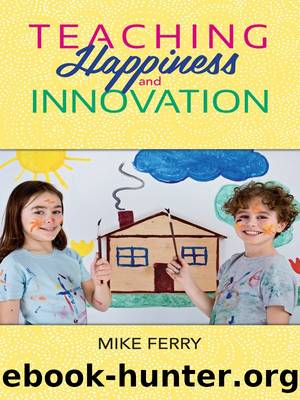Teaching Happiness and Innovation by Mike Ferry

Author:Mike Ferry [Ferry, Mike]
Language: eng
Format: epub
ISBN: 9781631921568
Published: 2014-12-15T00:00:00+00:00
Innovation
Innovation
Back in the old days of the 20th century, high school and college graduates sought jobs with big firms promising generous health care coverage, retirement plans, and other benefits. Employees knew that their companies would reward them for their hard work. Families could count on future income to pay the mortgage, plan for college, and sock away dollars for rainy days.
Fast forward to today. Even before the economic downturn of 2008, American companies were relocating to poorer countries whose workers demanded less pay. This trend was occurring as nations including China, India, and Brazil were rising. Many middle class white-collar jobs and skilled labor positions formerly held by Americans are now driving those countries forward. Over time, these growing economies will import more of our goods, which will be a good thing for everybody. At present, however, the overall employment situation in the US and other developed countries is a major challenge.
As most of us are painfully aware, good jobs are hard to find these days. Government efforts to spark recovery may work, but success is not guaranteed. We need new ideas and industries. We need to empower our kids to create them. We need to teach innovation.
Fortunately for our planet, our kids possess the engine they'll need to become more innovative. It's the brain, and as we already know, we can shape it to meet our needs. Brain plasticity, crucial in creating happiness, means that we can improve in any area of our lives. Even if we are not innately innovative, we can get better through practice.
What can we do at school and at home to equip our children with the skills of innovation? Let's start by what we mean when we say "innovation." Just as people have widely varying opinions of what happiness is, we have different perspectives with regards to defining innovation. I see innovation as something new that has a notable impact on our behavior and worldview. Innovation can refer to must-have products from the light bulb to the iPod and beyond. It can also include shifts in beliefs. Innovation can be local and modest in scope, or it can be global and wide-ranging in its impact. Innovation leads to new industries and markets as well as unique artistic and philosophical expressions.
How does innovation happen? Typically, new ways of thinking evolve slowly. "Eureka" moments, characterized by bolts of inspiration from the heavens or other sources, take place rarely, if at all. Instead, individuals and groups of people working together devise new solutions and interpretations by joining their knowledge and experiences. Innovation comes when separate elements are united in a way that forms a new combination that did not exist before. New ideas lead to more new ideas in an ever-expanding ripple effect. As Isaac Newton said, we can see a great distance if we stand on the shoulders of giants. Those who have come before us made it possible for us to create the future.
Recent literature on innovation refers to a concept known as "the adjacent possible.
Download
This site does not store any files on its server. We only index and link to content provided by other sites. Please contact the content providers to delete copyright contents if any and email us, we'll remove relevant links or contents immediately.
Deep learning with TensorFlow and Keras by Derrick mwiti(894)
Understanding PDA Autism in Kids: A Guide for Parents and Teachers to Support Neurodiverse Learners by Jehu Len(802)
The Victorian Era: A Captivating Guide to the Life of Queen Victoria and an Era in the History of the United Kingdom Known for Its Hierarchy-Based Social Order by Captivating History(596)
Writing Solid Code: Development Philosophies for Writing Bug-Free Programs by Steve Maguire(520)
Intersectionality in Educational Research by Dannielle Joy Davis; James L. Olive; Rachelle J. Brunn-Bevel; Susan R. Jones(497)
100 Ideas for Secondary Teachers: Engaging Parents by Janet Goodall & Kathryn Weston(494)
How to be assertive in any situation by Hadfield Sue & Hasson Gill(488)
Brain Teasers to Build Critical Thinking Skills: Brain Exercises for Tech, Banking, Case Interview Prep, and to Keep Your Mind Sharp by Kris Safarova(475)
Brain Teasers to Build Critical Thinking Skills by Safarova Kris(471)
Python 101 - Fundamentals by Sam(444)
Critical Curriculum Leadership : A Framework for Progressive Education by Rose M. Ylimaki(432)
The Art of Emotional Validation: Improve Your Communication Skills and Transform Your Relationships by Validating Emotions and Feelings by Emily Wright(403)
A Beginner's Guide to SSD Firmware by Unknown(394)
The Knights Templar: An Enthralling History of the Rise and Fall of the Most Influential Catholic Military Order by Wellman Billy(387)
NumPy : From Basic to Advance by bisht Karan Singh(387)
The Future Knowledge Compendium by Ellyard Peter;(382)
What Every Teacher Should Know about Learning, Memory, and the Brain by Tileston Donna E. Walker;(380)
Alma Maters (5th edition) by Unknown(377)
Make wealth from intraday trading by Maddy MADDY(361)
